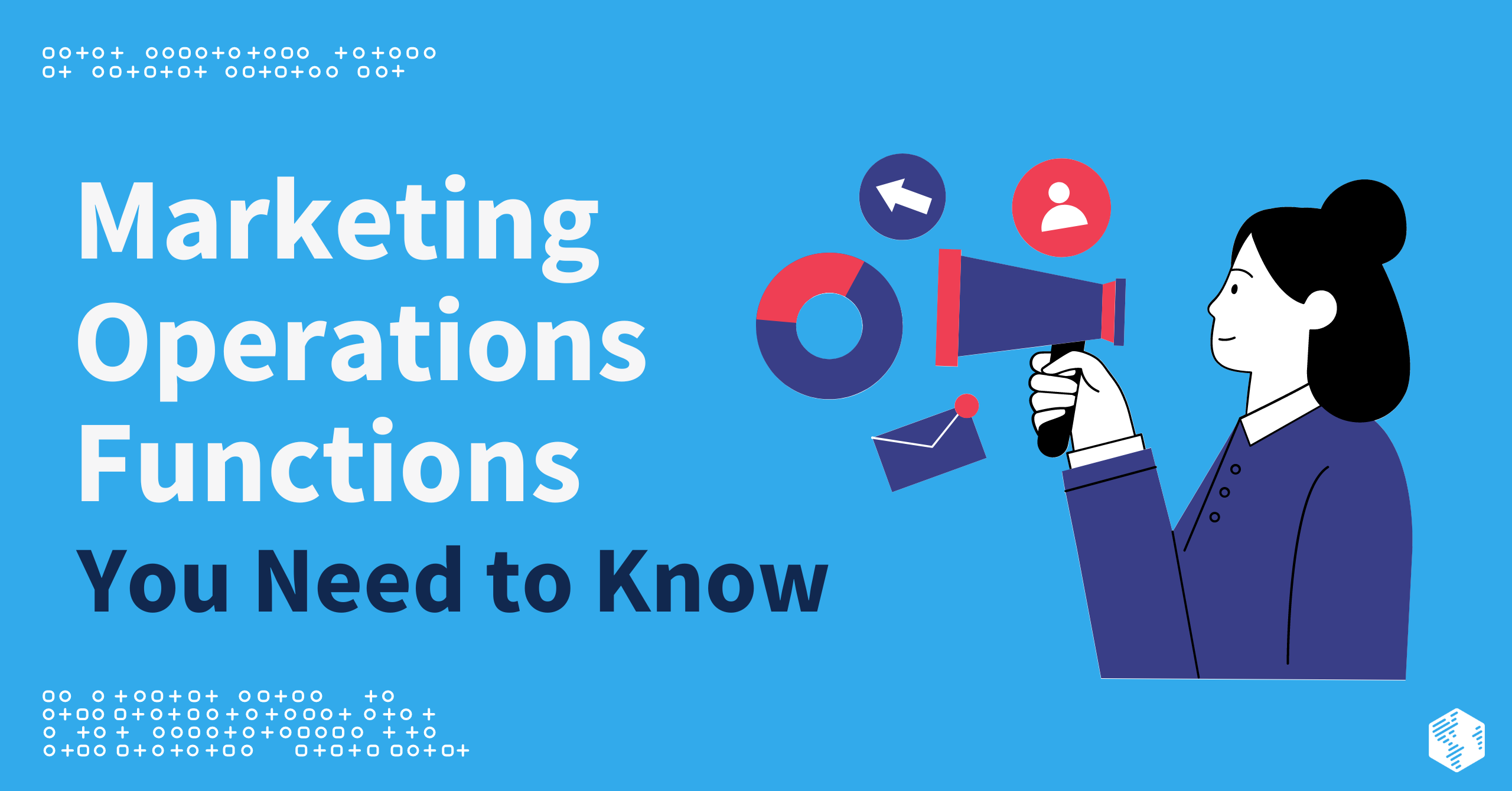All business-to-business (B2B) organizations know the value of marketing, but only the most successful companies understand the importance of investing in marketing operations (MarketingOps).
The numbers don’t lie: MarketingOps is the future of marketing. In fact, Gartner found that 49% of marketers have a marketing operations leader on their team.
MarketingOps is responsible for everything that happens behind the scenes of your B2B marketing strategy, from streamlining workflows and automating marketing tasks to improving productivity and analyzing customer data. The MarketingOps team makes sure your marketers have the tools, strategies, systems, and resources they need to reach your target audience, deliver marketing campaigns at scale, and achieve organizational revenue goals.
Is your B2B company ready to take the leap with MarketingOps? Start by examining these marketing operations functions and understanding exactly how MarketingOps will enable the success of your marketing efforts.
Function #1: Strategic Planning & Alignment
Marketing operations is responsible for defining the marketing department’s objectives and goals, ensuring those goals are aligned with your B2B organization’s overall business strategy, and identifying key metrics to help evaluate performance. From determining the marketing budget and calendar to managing project schedules, MarketingOps does it all.
Defining Marketing Objectives & Goals
Your marketing operations team will develop both short-term and long-term plans for your B2B marketing team. They will not only create SMART (specific, measurable, achievable, relevant, time-bound) goals but also align those goals with departmental and organizational objectives.
Aligning Marketing with Overall Business Strategy
Successful MarketingOps teams understand the goals and vision of your B2B company’s overall business strategy and work closely with the marketing department to ensure their activities and campaigns align with those organizational goals. The marketing operations department will communicate regularly with stakeholders to identify company revenue and growth goals and then collaborate with the marketers to make sure department objectives support these company-wide goals.
Establishing Key Performance Indicators (KPIs) for Measurement
MarketingOps will select relevant key performance indicators (KPIs) for different marketing initiatives and track them to measure the success of marketing campaigns and initiatives. These KPIs are extremely valuable—without establishing KPIs and measuring them regularly, you can’t track marketing performance.
The marketing operations team will work with company leadership and the marketing department to determine which metrics and KPIs should be used to measure success.
Function #2: Data Management & Analysis
Data is the foundation of marketing operations. MarketingOps is responsible for managing marketing data, including collecting data, organizing it uniformly into a centralized location, analyzing the results, and drawing conclusions to help guide decision-making.
Collecting & Organizing Marketing Data
MarketingOps oversees data sources and collection methods. The marketing operations team develops processes for collecting data, tracks data collection across all channels and functions, integrates data with new and existing marketing technology platforms, and organizes it in a centralized location.
The marketing operations team will also ensure the data is accurate and consistent so your B2B marketing team can more easily use it to make informed decisions.
Utilizing Data Analytics for Insights
MarketingOps takes vague, numerical data and makes it usable by adding substance, identifying trends, and turning the results into actionable insights. This process may include generating weekly or monthly reports, presenting the results to key stakeholders and your marketing department, and offering insights that marketers can use to improve campaigns and meet performance goals.
Leveraging Data to Optimize Campaigns & Improve Return on Investment (ROI)
By analyzing data and establishing key insights, MarketingOps leverages marketing data to make informed decisions, refine marketing strategies, optimize digital campaigns, and improve your return on investment (ROI). Regular monitoring and data analysis means your marketing operations team is prepared to identify areas for improvement, make data-driven decisions, and drive overall growth.
Function #3: Technology Integration & Optimization
It’s the job of the marketing operations team to oversee the marketing tech stack—a long list that may include content management systems (CMSs), marketing automation tools, search engine optimization (SEO) and keyword research tools, social media management platforms, email marketing tools, creative collaboration software, and more. MarketingOps is also responsible for ensuring the technology is integrated, optimized, and secure.
Evaluating & Selecting Marketing Technologies
More and more marketing technologies are available every day. MarketingOps researches emerging marketing software and tools, determines whether they would improve marketing processes across your B2B organization, test use cases, and decide whether to invest in the new platform.
Additionally, MarketingOps trains the marketing team as well as relevant marketing operations staff on how to use the unfamiliar technology effectively.
Implementing Marketing Automation Tools
Marketing automation tools are designed to automate repetitive marketing tasks, freeing up marketers to spend their time on revenue-generating work. The marketing operations team finds and implements the best marketing automation software to streamline marketing processes, support marketing campaigns, and let your marketing team focus on the bottom line.
Integrating Systems for Seamless Workflows
MarketingOps is responsible for data integration across platforms and ensures all marketing technology is compatible together. The marketing operations team not only integrates new software with existing systems but also streamlines the flow of data to and from various platforms.
Additionally, MarketingOps works with the sales and customer service teams to make sure data can seamlessly move across customer-facing departments.
Function #4: Streamlining Marketing Processes
Marketing operations creates, optimizes, and documents the workflows and processes everyone in the marketing department should follow to achieve their marketing objectives. Not only does MarketingOps develop new processes, but it also improves existing marketing workflows so that all your marketers are on the same page and following the same efficient systems.
Creating Efficient Workflows & Approval Processes
MarketingOps will identify workflow bottlenecks and streamline the approval process to efficiently achieve marketing goals. The marketing operations team works with organizational and departmental stakeholders to build a roadmap of actionable steps that will guide your B2B marketing team.
Agile project management is also an important part of marketing operations. MarketingOps helps plan, execute, and adjust new marketing processes, so flexibility is key—then, when the marketing landscape shifts or new platforms are introduced, it can pivot, react to the changes, and even predict how to best optimize workflows.
Reducing Bottlenecks & Improving Productivity
To further improve productivity and reduce bottlenecks, MarketingOps breaks down workflows, automates repetitive functions, and assigns tasks across the workflow to individual team members so everyone in your B2B marketing department knows what they are responsible for (and who they report to).
Marketing operations also simplifies and standardizes marketing processes to continue to reduce redundancies, streamline operations, and increase efficiency.
Enhancing Collaboration Between Marketing & Other Departments
Most B2B companies have marketing, sales, and customer service teams that operate in silos—no collaboration and little communication across departments. MarketingOps breaks down these silos to foster cross-functional collaboration between marketing and these other customer-facing departments. By ensuring all teams have access to the tools, resources, data, and personnel they need and promoting a culture of accountability and transparency, marketing operations ensures these departments work together to achieve organizational revenue and growth goals.
Function #5: Budget & Resource Allocation
Now more than ever, B2B leadership is concerned about minimizing unnecessary expenditures and improving ROI. MarketingOps is a key piece of this puzzle, keeping track of marketing expenses, ensuring the budget is aligned with organizational objectives, allocating resources effectively, and investing in platforms that bring the strongest ROI.
Planning the Budget & Allocation Strategies
MarketingOps will not only plan the overall marketing department budget, which includes employees, training, software, consultants, but also allocate funds across marketing channels, such as SEO, advertising, email marketing, social media management, public relations (PR), and more.
The marketing operations team is also responsible for calculating the ROI for each marketing initiative and, based on the results, deciding how much to spend on each channel, platform, and campaign.
Monitoring & Controlling Marketing Expenditures
After outlining and allocating the budget, MarketingOps ensures that the funds are spent appropriately. It will track weekly, monthly, quarterly, and yearly progress, measure that progress against your marketing and organizational revenue goals, and adjust spending as needed to maximize efficiency and improve ROI.
Ensuring Optimal Resource Allocation for Maximum Impact
By investing in channels with the highest ROI and creating processes that lead to maximum efficiency, MarketingOps ensures resources are optimized and marketers are allocated effectively—all within budget.
The marketing operations team will also examine the benefits of outsourcing some (or most) marketing efforts and, if they decide to move forward, ensure that there’s a strong balance and open communication between the in-house and outsourced teams.
Function #6: Marketing Performance Management
MarketingOps manages the performance of your marketing department by tracking important metrics, engagement across platforms, and overall performance as well as using that data to optimize marketing strategies and campaigns. The marketing operations team is also responsible for defining project milestones and progress goals to ensure the performance measurement process is transparent for all stakeholders.
Establishing Key Metrics for Evaluation
The marketing operations team will establish key metrics for different marketing goals—such as brand awareness, lead generation, etc. These KPIs are how MarketingOps will measure the performance of campaigns and evaluate the efficiency of the overall marketing department.
Performance metrics should also be aligned with your organization’s business objectives. MarketingOps will identify KPIs that not only illuminate the performance of marketing campaigns but also are aligned with your B2B company’s overall growth goals.
Tracking & Reporting Marketing Campaign Performance
MarketingOps relies on accurate metrics to measure the success of your marketing campaigns. Your marketing operations team will use (and probably customize) a platform that can both capture engagement across channels and provide reports on overall campaign performance. And, instead of asking your B2B marketing team to constantly check in, these MarketingOps performance reports will also track milestones, monitor progress, and offer project updates as needed.
Providing Insights for Data-Driven Decision-Making
MarketingOps analyzes marketing performance data, extracts actionable insights, and leverages the results to optimize marketing strategies as well as make informed decisions about future marketing campaigns. By constantly collecting performance data and drawing insights, marketing operations helps B2B organizations continuously refine and improve their marketing efforts over time.
Function #7: Customer Data Management
MarketingOps is responsible for collecting, managing, and analyzing customer data used by the marketing team, not only making sure it is accurate but also organizing it so the data can be leveraged for personalized marketing campaigns.
Collecting & Analyzing Customer Data
The marketing operations team will collect and organize customer data to ensure it is accurate, standardized, and secure, and they will also make sure customer data is used ethically and that privacy is taken into consideration whenever someone wants to access or use that data.
MarketingOps conducts customer segmentation for targeted marketing too, grouping them into sets based on customer lifecycle stage, pain points, and other factors.
Personalizing & Tailoring Marketing Efforts
The power of personalization in marketing is undeniable. The good news is that MarketingOps makes it easier than ever for B2B companies to tailor marketing messages and create personalized content to reach your ideal customers.
Based on segmented customer personas, your marketers can create targeted, personalized marketing campaigns that reach your target audience. MarketingOps will use these valuable insights to guide the marketing team and help them create targeted, relevant, and personalized marketing campaigns that attract similar customers.
Ensuring Data Privacy & Security Compliance
Keeping customer data secure is of the utmost importance; the last thing you want is for your customer’s private information to be shared or misused.
Since the MarketingOps team collects and manages user data, they are responsible for safeguarding customer information and complying with data protection regulations. Marketing operations will not only ensure the data is accurate and integrated across systems but also ensure customer data remains private and secure.
Function #8: Customer Journey Mapping & Optimization
The customer journey should guide the efforts of your marketing team—which means it falls under the scope of MarketingOps. Marketing operations will map the customer journey, optimize the customer experience at every stage of the journey, and use the resulting insights to make informed decisions about how to improve the customer experience.
Understanding the Customer Journey
MarketingOps analyzes customer behavior at every stage of the customer’s journey in order to identify touchpoints and customer actions, create a full visualization of the customer journey, and see how customers interact with your brand.
Using customer data and marketing analytics tools to learn about the customer journey allows the marketing operations team to collaborate with key stakeholders across departments and determine the best way to streamline the customer experience from beginning to end.
Identifying Pain Points & Opportunities
By mapping the customer journey, MarketingOps can understand the pain points, needs, concerns, motivations, and emotions of customers at different stages. The marketing operations team is also responsible for gathering customer feedback from various sources like interviews, surveys, reviews, social media, etc. and drawing insights about opportunities to improve the customer journey.
In other words, after identifying customer pain points, MarketingOps creates plans and processes to address those pain points, which increases customer satisfaction and enhances the customer experience.
Implementing Improvements to Enhance the Customer Experience
Based on insights from mapping the customer journey and gathering customer feedback, MarketingOps implements customer-centric changes that improve overall satisfaction and meet customer expectations. It focuses on eliminating or reducing pain points throughout the customer journey and amplifying or creating positive experiences that delight customers.
This process is iterative; MarketingOps will continuously improve the customer journey and guide sales, marketing, and customer success teams on how they can enhance the customer experience.
Function #9: Scalable Campaign Management
One of the goals of MarketingOps is to create processes and campaigns that scale—both across the marketing department and the organization as a whole. The marketing operations team creates templates, defines processes, manages calendars, coordinates omni-channel content identifies tools needed to make projects successful at scale.
Creating Templates & Repeatable Processes
MarketingOps will not only develop campaign templates to ensure consistency across channels but also document best practices so it’s easier to repeat successful campaigns. It eliminates chaos or confusion so that your marketers are prepared to run successful campaigns.
With established processes and reusable templates at hand, your B2B marketing team will have what they need to complete projects in the same way each time—on budget, within the project scope, and on schedule.
Automating Campaign Development
Marketing automation makes it easier than ever to efficiently run campaigns. By reducing errors, defining workflow triggers, and streamlining repetitive tasks, marketing automation tools help your marketing team execute timely campaigns faster.
MarketingOps will manage the automation process and leverage marketing automation tools to their fullest extent. It will implement the right technology to track, analyze, automate, and optimize campaign development.
Enabling Expansion into New Markets
MarketingOps is constantly searching for opportunities to expand into new markets and, at the same time, preparing to scale when those opportunities arise. The marketing operations team conducts research and gathers data to learn how they can best adapt existing strategies to local markets, deliver campaigns that impress customers, understand what attracts and retains customers, and use those insights to create sustainable growth.
Function #10: Integration with Sales & Revenue Operations
Marketing operations is designed to be cross-functional. MarketingOps will work with sales operations (SalesOps) and revenue operations (RevOps) to establish shared revenue goals, align customer-facing teams, and create a unified growth strategy.
Aligning Marketing & Sales Efforts
By sharing common objectives and a collective vision, MarketingOps bridges the gap between the marketing and sales department and ensures both teams coordinate to achieve unified revenue goals. Clear communication channels, cross-functional collaboration, shared metrics, and coordinated efforts are all sponsored by MarketingOps to ensure these sales and marketing are aligned.
Facilitating Lead Handovers & Nurturing
An important part of marketing operations is qualifying leads so the marketing team can hand them over to the sales department.
To optimize the lead handover and nurturing process—and to improve lead-to-customer conversion rates, MarketingOps meets with both marketers and sales reps to determine what constitutes a qualified lead for each department and what information and progress needs to be shared throughout the process and establishes workflows to ensure both teams have the same lead management and nurturing expectations.
Collaborating to Drive Revenue Growth
Integrating SalesOps and RevOps with MarketingOps leads to more effective campaigns, higher conversion rates, and better lead management—all working together to drive collective ROI. When marketing and sales collaborate to achieve revenue goals and each team increases their contribution to overall revenue, your B2B organization will see predictable growth.
Optimize Your Marketing Performance with MarketingOps at OneIMS
Let’s review the key responsibilities and functions of marketing operations:
- Planning the marketing strategy and aligning goals
- Managing and analyzing data
- Integrating and optimizing the marketing tech stack
- Streamlining marketing processes
- Allocating the budget and resources
- Tracking marketing performance
- Monitoring customer data
- Mapping and optimizing the customer journey
- Managing campaigns at scale
- Integrating marketing with sales and revenue operations
An effective MarketingOps strategy—one that encompasses these ten essential functions—is now critically important to a successful B2B marketing strategy. And B2B organizations across industries are starting to take note.
If you don’t have a marketing operations team, now is the time to consider how MarketingOps can help you streamline your marketing efforts, create successful digital marketing campaigns, and optimize your marketing strategy from beginning to end.
You have two options: Start from scratch—which would require hiring a team of MarketingOps professionals, expanding your tech stack, and pausing progress while you reconfigure your marketing processes—or work with an established, experienced marketing operations agency like OneIMS.
If you decide to partner with us, you’ll have access to a team of marketing operations experts, our MarketingOps platforms, and personalized guidance—all stemming from our long history of working with B2B companies to build a strong marketing operations foundation.
We have a long history of working with companies in a variety of industries to develop innovative and data-driven marketing solutions. We pride ourselves on producing measurable and sustainable results.
But you don’t have to take our word for it. View testimonials from our clients and read our blog to get an idea of our training, experience, and track record of success.
Are you ready to see how marketing operations can help your B2B company grow? Schedule a consultation with us today to get started.



































